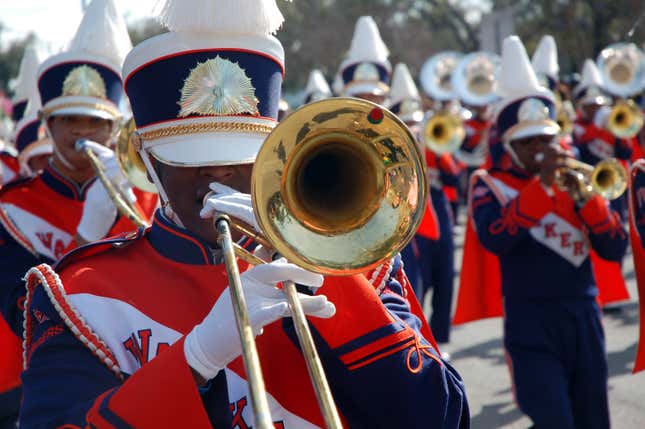
New Orleans is recognized around the world as the birthplace of jazz. You can barely walk down the street in the French Quarter without hearing trumpets blaring and seeing bands march through the streets. It’s the place where great jazz musicians like Louis Armstrong, Trombone Shorty and Wynton Marsalis were born. But because cranky old Karens have been trying to steal our Black joy for centuries, there was a little-known law on the books that wanted to keep the music the city is known for out of its public schools. But 100 years to the day after the ban was imposed, the school board voted to let the music play.
At a school board meeting on March 24, 1922, a woman by the name of Mrs. Adolph Baumgartner made a motion to abolish jazz music and jazz dancing in the New Orleans public schools. The cantankerous fun-stealer was afraid of the influence the rhythmic music would have on students. “Jazz music and jazz dancing in schools should be stopped at once,” Baumgartner said at the meeting. “I have seen a lot of rough dancing in school auditoriums lately.” But she didn’t go as far as saying she wanted to ban music and dancing altogether. She was perfectly fine with making a carveout for music that was a little less lively, saying “they can dance the one-step, two-step and the waltz.” Baumgartner’s motion went on to pass with little objection.
Despite her best effort, Mrs. Baumgartner wasn’t able to remove jazz from the schools completely. Jazz is taught in many New Orleans public schools, and school jazz bands are popular fixtures of Mardi Gras celebrations. But the antiquated law was still on the books, and the school board wanted to get rid of it forever. The law was brought to the board’s attention when Ken Ducote, executive director of the Greater New Orleans Collaborative of Charter Schools, read the book, “Chord Changes on the Chalkboard: How Public School Teachers Shaped Jazz and the Music of New Orleans,” by historian Al Kennedy. Kennedy compares the jazz ban to the efforts to ban books that deal with race and sexual identity that are spreading across the country today. “It seems like they were more afraid of it being a bad influence than anything else,” he said.
But school board members think a ban on jazz in New Orleans is absurd. “It’s like if Colorado passed a rule banning students from looking at the Rocky Mountains,” Ducote said. Current board member Carlos Zervigon introduced the motion to reverse the ban at a March 22 school board committee meeting. And in a March 24 vote, the Orleans Parish school board voted to officially reverse the band. When addressing the committee before the vote, school board President Olin Parker pointed out that the law was “rooted in racism.” He went on to express his appreciation for students and school faculty who participate in bands across the district.
“In this instance and in this instance only, we’re glad that the policy was ignored by our students, by our schools,” board member Katherine Baudouin said. “Our schools played a major role in the development of jazz.”

